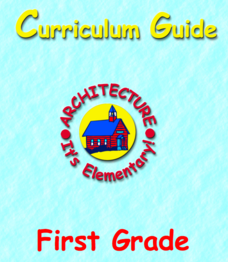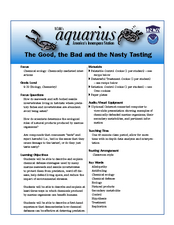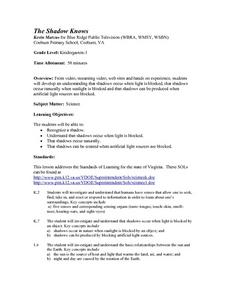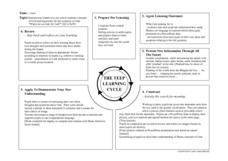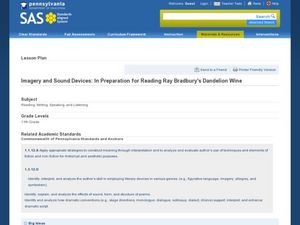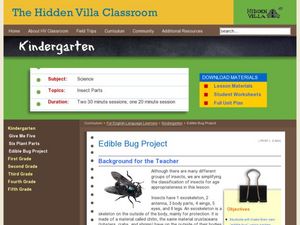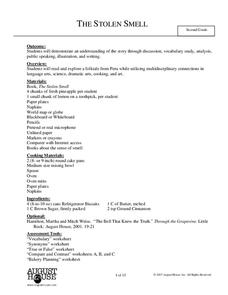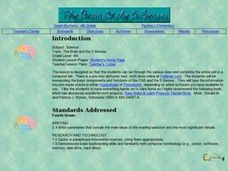Curated OER
In Touch with Apples
Students read "How To Make an Apple Pie and See the World", the story of a girl who traveled the world to find the ingredients to make her apple pie. They conduct a series of interdisciplinary activities including testing their senses,...
American Institute of Architects
Architecture: It's Elementary!—First Grade
Build an interest and appreciation for architecture in your young learners with this fun 10-lesson art unit. Engaging children in using their five senses, the class first observes the environment around them, paying special attention to...
Curated OER
Exploring Learned and Innate Behavior
Learners explore the differences between learned and innate behavior among humans and monkeys. They complete an assignment and read articles about two studies, which used similar test methods to show that infants and monkeys share an...
Curated OER
Make Sense of Nature
Learners participate in this program that heightens their awareness and curiosity of nature as well as their sense of adventure and exploring new surroundings. They identify and choose an object from nature after exploring it with other...
Curated OER
The Good, the Bad and the Nasty Tasting
Students examine the effect of chemicals from marine plants or animals on predator's preferences. In this ecology lesson plan, students conduct taste tests and collect necessary data. They write their conclusion after analyzing...
Curated OER
The Five Senses
Pupils explore and study about the five senses. They focus on their sense of smell and interact with certain ingredients, including white vinegar. Each student also helps to create and share a concept map on the sense of smell utilizing...
Curated OER
Funny Ears
Young scientists get a activity that has a picture of a dog, a donkey, a person, a mouse, a rabbit, and a cat. Each picture has the wrong ears attached to it! Learners must draw lines matching up the ears with the correct recipient. The...
Curated OER
Crafting Poetry: A Sensory Journey
Tenth graders experiment with poetry devices to write poems. In this poetry lesson, 10th graders participate in learning stations. Students create a word pool and select a word from the list to create a line of poetry. Students complete...
Curated OER
Is There Seaweed/Algae in Your Food?
Pupils discover that seaweed/algae is a small part of the resources the oceans provide. By investigating common household products, students discover that human senses are not enough to detect the presence of seaweed/algae in food.
Curated OER
Developing Environmental Awareness Through Problem Solving
Young scholars examine the relationships among living and non-living parts of the environment. Using their senses, they identify the objects in their classroom. In groups, they participate in experiments to discover where electricity...
Kenan Fellows
Evaluating Sensors and the Impacts of Physiological Stress: Designing a Wearable Device for Rescue Workers
A long-term project has scholars consider ways in which sensors help monitor physiological stress levels of rescue workers. They design and create a portable device for this purpose. Techies to the rescue!
Curated OER
Life Science Observations: Living vs. Non Living Things
Students investigate the difference between living and non-living things. In this life science lesson, students discover the different characteristics of living things and the natural or human created non-living things. Students search...
Curated OER
The Nervous System and the Effects of Drugs
In this nervous system instructional activity, learners read information about how the body receives and sends out information through the peripheral nervous system and central nervous system. Then students complete 3 short answer...
Curated OER
The Shadow Knows - Creating Shadows
Young learners recognize a shadow and witness how shadows occur when light is blocked. They access streamed video, standard video, and websites in order to engage in their study of how light is naturally blocked to create shadows. An...
Curated OER
Plant Parts
Little ones identify the parts of a plant and practice following directions at the same time. They color each part of the flowering plant the color indicated on the sheet. Roots are brown, leaves are green, the flower is red, and the...
Curated OER
"Where do we look for God?"
Students iintroduced to the unit which explores concepts of God and arguments for the existence of God. They reflect on their comprehension about their own thoughts and questions which may have arisen. Students encourage sharing of...
Curated OER
Imagery and Sound Devices: In Preparation for Reading Ray Bradbury's Dandelion Wine
Twelfth graders analyze Ray Bradbury's use of techniques and elements of fiction as well as nonfiction in the novel Dandelion Wine. In this novel analysis lesson, 12th graders analyze the sensory techniques in Dandelion Wine. Students...
Curated OER
Edible Bug Project
Students recognize the characteristics of insects. In this edible bugs lesson, students observe the body parts of an insect. Students create an edible insect using a grape, carrot sticks and sorrel stems and leaves. Students share the...
Loudoun County Public Schools
Figurative Language Packet
A definitive resource for your figurative language unit includes several worksheets and activities to reinforce writing skills. It addresses poetic elements such as simile and metaphor, personification, hyperbole, and idioms, and...
Curated OER
The Stolen Smell
Second graders read the story The Stolen Smell and participate in many language arts based activity connected to the story. They participate in discussions, vocabulary work, analyzing the story, public speaking, illustrating pictures,...
Statistics Education Web
Walk the Line
How confident are you? Explore the meaning of a confidence interval using class collected data. Learners analyze data and follow the steps to determine a 95 percent confidence interval. They then interpret the meaning of the confidence...
Curated OER
U.S. History: Our Constitutional Amendments
Eighth graders conduct Internet research about Constitutional Amendments and present oral reports on their findings. Their reports also include visual representations depicting their chosen amendment's focal point. Students discuss the...
Curated OER
Triangle Sensory Test with Oreo Cookies Lesson Plan
Learners voluntarily participate in a sensory test and examine hypothesis testing and statistical significance. They use low-fat and original Oero cookies for this experiment.
Curated OER
Observations and Inferences
Young scholars observe how to distinguish observations form inferences. In this examining inferences lesson plan students list observations relating to the activity and discuss the importance of them.



